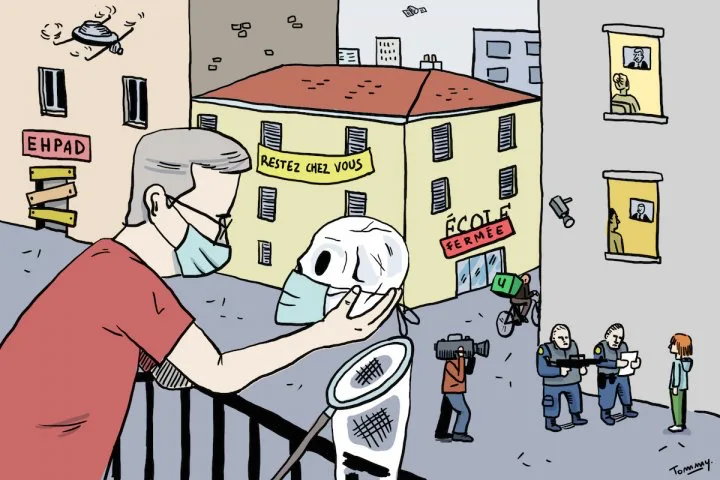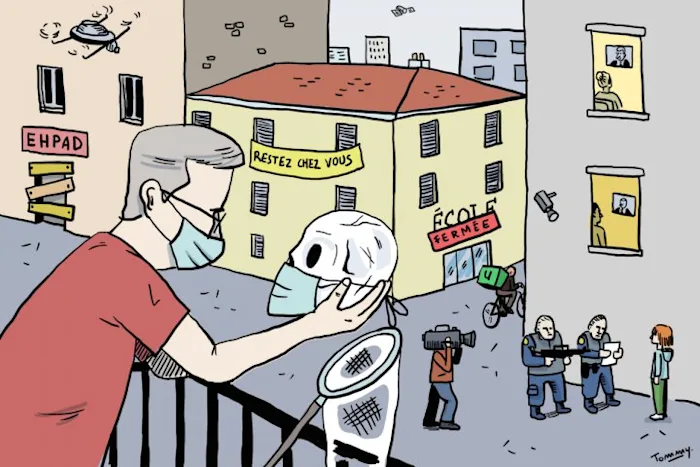Things Seen
Julien Coupat et al.
What have we seen in the last six months since the virus emerged, with the avalanche of transformations it has produced? How can we prevent the weight of habit and the force of amnesia from acclimating us to the unthinkable, the terrifying? In an effort to prevent the extraordinary and dreadful from becoming ordinary and legal with the passage of time, this text takes us on a journey across our own chaotic epoch.1
Other languages: Français, Español
We have seen the most elementary liberty of bourgeois constitutions — the freedom to come and go — abolished with the snap of a finger.
We have seen a president claiming to regulate the “details of our everyday life” from his residence at the Presidential palace.
We have seen a government promulgating new customs overnight, such as the correct way to greet each other, to the point of decreeing a “new normality”.
We have heard children described as “virological bombs” — and then we heard nothing else on the matter.
We have seen a mayor prohibited from sitting for more than two minutes on the benches of “his” city, and another from buying less than three baguettes at a time.
We listened to a sad medical professor refer to “a type of collective suicide for themselves and others” when describing young people sunbathing in a park.
We have seen a thoroughly-discredited mass media clamoring to regain a few scraps of moral integrity by means of a massive guilt-trip of the population, as if resurrecting the specter of an “internal scourge” would win us back to their side.2
We have seen 6,000 “mountain” units of the national police equipped with helicopters, drones, speedboats and 4×4’s hurl themselves into a nationwide effort to stalk hiking trails, river banks, lakes, and (of course) seaside beaches.
We have seen Poles returning home to quarantine forced to choose between taking a selfie on an app utilizing geolocation and facial recognition, or else receiving a visit from the police.
We heard old men banging on their bedroom doors in nursing homes, begging to be let out so they could feel the sun for what might be the last time, and a civilized barbarism offering them medicalized excuses.
We have seen the concept of “social distance”, first developed in 1920s America as a way of quantifying the hostility of whites to Blacks, become the standard metric for a society of strangers.3 In effect, we saw a concept born in response to the Chicago race riots of 1919 mobilized to gum up the global wave of insurgency begun in 2019.
We have seen, on our nights in confinement, Elon Musk’s satellites replace the stars, just as the hunt for Pokemon replaced the hunt for now-extinct butterflies.
We’ve seen our apartment, first offered to us as a refuge, gradually close in on us like a trap.
We have seen the metropolis, once it vanished as a theater of distractions, reveal itself as a panoptic space of police control.
We have seen laid bare before us the constricted network of dependencies that maintain our lives in a state of suspension. We have seen the value our lives hold, as well as the forces that hold us.
We have seen, in its suspension, social life as an immense accumulation of absurd constraints.
We didn’t see Cannes, Roland Garros, or the Tour de France — and that was just fine.
We have read this communiqué from the Swiss Employers Center: “We must ensure that people do not grow accustomed to the current situation, or allow themselves to be taken in by its dubious nature: having far less traffic on the roads, a sky without air traffic, less noise and commotion, a return to a simple life, local commerce, the end of consumer society […] Such romantic visions are deceptive, because the slowdown in social and economic life is actually very painful for countless people who have no desire to endure this forced experience of degrowth any longer.”
We have seen the United States, France and Italy wage an implacable war against an invisible enemy, following China’s lead. We have seen the most Occidental states casually adopt the slogans, methods, and manners once attributed to “Eastern despotisms”, but without the latter’s means. We have seen China’s ruthless governmentality portrayed ever more loudly as the enemy, the more it in fact serves as the model. We have seen the direction that contemporary democracies are headed.
We have seen the social gobbled up by the governmental, and the latter reduced to pure hostility. We have seen our perfected separation dovetail with the project of a perfect governmentality.
We have watched weeks of televised drama around masks, tests, and ICU’s. We have seen in this masquerade the reflection of our own measureless impotence. We have seen the sad passion of being well-governed as the obligation to be perpetually disappointed.


We have seen small town seamstresses make up for the shortcomings of the state, while caregivers speak with greater poise than a so-called President. Everywhere, we see spokesmen with nothing to say, generals without armies, strategists without a strategy, and ministers without a magisterium. We have seen a collapse of that old faith in the State at the very moment the latter had seemed to discover an unexpected raison d’être.
We have seen the French state, so often struck by grandiosity (as is everything else in France), reduced to its true status as a failed state. We have seen the Third World realities concealed beneath its gilded exterior: filching masks from its own localities and its “European allies”, mobilizing the army like that first Mexican president in order to stage one’s control over the situation in ways no one believes, a fanfare of helicopters and high-speed trains with all the efficacy of a cardboard box, meanwhile taking credit for the spontaneous solidarity of caregivers whose resources they have not ceased to plunder.
We have seen, in the frayed scrubs of our medical staff, the decaying patchwork that comprises “our institutions”.
We have seen the meta-bureaucracy of private global consulting firms that are every bit as clumsy as the state bureaucracies, and which everywhere extend their reach.
We have seen that the United States is a failed state, every bit as much as France.
We have seen the ubiquitous pretension to administer every last thing, to manage everything from afar, come crashing down upon reality—beginning first of all with the hospitals.
We have seen the reflex to centralize, plan, and to organize only makes the situation worse, and ameliorates only the image of the organizers.
At the height of the crisis, we saw the State as something we no longer need, and which offered nothing in the way of relief besides veiled threats and low blows. We have seen that to live without the State, or at a distance from its empire, has for many become the first vital measure.
We have seen the deployment of local self-organization, little by little, within lived territories, as a vital reflex restoring a sense of purpose and grounding — a tiny but real experience of collective power.
We have seen a passion for gardening, and even for chicken coops, seize people who previously had only three pots of wilted flowers.
We have seen, in a test-run of global containment, no caesura between the day before and the day after. We saw it as simply a revelation of the world that was already there, the consistency of which had been deadly long before.
We have seen, as the majority of the world’s population was placed under house arrest, the first emergence of the new architecture of separation, where an absence of contact forms the precondition for the cybernetic mediation of all relationships.
We have seen the revelation, through Ministry of the Interior statistics regarding the 20% of Parisians who left the city to quarantine elsewhere, of an entire ecosystem of mass surveillance hitherto concealed. We have seen that it was futile, in this regard, to distinguish between state organization and private data brokers, between those who hold the rights and those who work the levers.
We have heard Eric Schmitt, a former Google boss who has since become a pillar of the U.S. military-industrial complex, say aloud what most are still too careful to admit officially in France: the coordinated de-schooling of children is indeed a “mass experiment in remote learning”. He lays out the plan clearly:
“If we are to build a future economy and education system based on tele-everything, we need a fully connected population and ultrafast infrastructure. The government must make a massive investment—perhaps as part of a stimulus package—to convert the nation’s digital infrastructure to cloud-based platforms and link them with a 5G network”4.
We have seen, in his call for gratitude to the giants of the software and tech industry (‘think about what your life would be like without Amazon!’), the triumphant voice of our new masters.
We have seen, under the incontrovertible pretext of the pandemic, the coherence of previously disjointed elements of the imperial plans: geolocalization, facial recognition, smart meters, swarms of drones, the prohibition of cash transactions, the internet of things, the proliferation of sensors and tracking devices, digital house arrest, exaggerated privatization, massive cutbacks achieved by means of remote work, remote-consumption, remote-conferencing, remote-education, remote-consultations, remote-surveillance and, finally, remote-licensing.
We have seen how access to technological equipment is a condition for enduring a confinement that, even ten years ago, would have been considered intolerable — a bit like how the introduction of television in prison helped to extinguish the great revolts there.


We have witnessed the rapid inflation of a specific type of technology, the kind that, as Kafka observed, destroys us because it “multiplies what is ghostly between men.”5
We have seen, with global confinement, the socialization of the virtual respond to the virtualization of the social. The social is no longer the real. The real is no longer the social.
We have seen police curfews replace medical quarantines in the U.S., where “COVID tracking apps” are being used to track down rioters.
We have seen demonstrations which, in France, were once banned on inscrutable grounds of maintaining public order, are now banned on inscrutable grounds of maintaining public health.
We have seen, with the population confined, police enjoying their reclaimed sovereignty over an ideally deserted public space, up to and including murder. And we have seen in return, in the United States, what the successful end to confinement can consist of: a return to the street, to rioting, looting, the torching of police precincts, big box stores, banks, and government buildings.
We saw, on a balcony in Nantes, a stupid and cowardly banner reading “Stay at home! Let’s prepare the struggles of tomorrow!”
Everywhere, we have seen citizens echoing the old “go home!” barked at us by cops and their drones.
We have seen the Left, as usual, at the vanguard of the same “civic virtue” that our rulers aspire to produce—the vanguard, therefore, of tailism.
We have seen the joke of the “license to live” imagined in 1947 by the Dadaists of the Da Costa Encyclopedic become reality as state policy and citizenly ordinance. The fact that it was possible for everyone to obtain them should have alerted us to the screwball nature of the initiative.
We have seen what “austerity” is about, along with the moral imperative of getting up early in the morning to go to work.
We have seen, for those who continue to work, that forced labor is the truth of waged labor, that it belongs to the essence of exploitation to be limitless, and that self-exploitation forms its cornerstone.
We have seen the extent to which social hierarchy is based purely on one’s degree of parasitism. We have seen utilitarian society dismiss its own managers as “inessential”.
We have experienced the false alternative between a public space completely under control and a private space delivered over to the same fate, along with the near total lack of any intermediate places on the basis of which we might begin to regain control over the conditions of our existence at a local level. We have seen, in the proliferation of intermediaries of all sorts — commercial as well as political, intellectual as well as medical — the outcome of this absence of places of life.
We have felt the media and governmental apparatus play upon our moods like a piano, from continuous retractions to outright lies, from massive contradictions to phony revelations. And enjoying the exercise so much, that they intend to continue it as long as possible.
We have experienced how, through the immense threat of the virus, we were bound to ourselves by way of being bound to others, but through a bond that is also the great unbinding: fear.
We have seen a new civic virtue emerge around wearing a mask, which only yesterday was considered a crime. We have seen the fear of altruistic protest, the normopathy of being made into an example. We have seen a way of life marked by its complete disarray, by its complete estrangement from itself, offer lessons in good manners to others. In this uncertainty, in this estrangement, we have glimpsed the promise of completely reprogrammable customs.
We have seen governments and multinationals celebrate care solely in the hopes of dissuading us from going to war with them. We have watched as these champions of disrepute attempt to drown out the booing directed at them by cheering on the most doomed of wage laborers. We have seen perennial cowards reinvent the heroism of the “front-line warriors” as the ultimate excuse to hide out.
We have seen how the impossibility of distinguishing the lie from the truth—and not the exclusive reign of the lie — made us manipulable at will, as the slightest scraps of conclusive information are refuted top to bottom later the same day by other no less improbable ones; we have seen that it is enough to maintain a relative fog over all the data monopolized by our rulers in order to cause us to lose our footing.
We have seen science so shot through with special interests that it becomes incapable of producing the slightest hint of truth. We have seen knowledge so saturated with power that it implodes. We have been left with intuition and situated research as the last practicable paths to reality, and the root of all logical reasoning.
We have seen the cause of “public health” function as the pure and simple expropriation of every sensible certainty concerning our true health.
We have yet to taste the benevolent inquisition of the Ministry of Health’s “guardian angel brigades”.
We have seen the Sovereign of the republic realize his dream of gathering into a mass all of his subjects—perfectly separated between the four walls of their homes and in front of their screens—reduced finally to his exclusive contemplation. We have seen the Leviathan realized.
We have seen Macron quietly take over the 1st of May from the workers and the good old days of the CNR [National Council of the Résistance], and the Left respond in mimetic fashion by asserting its legacy, rather than acknowledging its definitive expiration.
We have seen, for two whole months, the eternal Left multiply its calls in the void and its programs for no one. We have seen it incapable, in these “exceptional circumstances”, of accomplishing anything other than mobilization, that is to say, the exploitation to the point of exhaustion of the last remaining subjective resources.
We have seen the great libertarians praising the confinement and promoting the wearing of masks by citizens, while the worst fascists denounce it as tyranny. The anarchist who wants to believe in some good will or even benevolence of the State thus reminds us that there is no government without self-governance, and vice versa. Government and self-governance are interdependent, part of the same system. That the shepherd cares for his flock has never prevented him from leading his lambs to the slaughter.
We have seen Marxists dumbfounded that the “servants of capital” are willing to interrupt its reproduction even slightly, choking at the thought that the economic clergy might decide to halt it even a little bit; in short, we have seen the Marxists discover that the economy is not a brute and unsurpassable reality, but a mode of governing and of producing a certain type of man.
We have seen a Burgundian bourgeois, a philosopher in his own time, one who only yesterday sang about “economics as the science of passionate interests” while calling on Microsoft to finance his endowed university chair, call for an exit from the economy 6.
We have seen, as the confinement first began, a rich Chinese man from Aubervilliers poach his son’s teacher as a home tutor by doubling her salary — less stingy than many families of the Parisian bourgeoisie, but no less determined to put an end to public education.
We have seen the Ministry of Education call on its staff to remain vigilant “in school hallways and courtyards, and avoid saying things that degrade social cohesion”.
We have encountered, in the undergrowth of our confinement, the complicit smiles of other offenders. We have seen a government so focused on shoring up discipline that it winds up conferring the airs of a conspiracy on a simple picnic in the forest, thereby improving the reflexes of upright citizens.
We have seen the National Federation of Farmers’ Unions [FNSEA], always ready to respawn new “youth workcamps” (as it did in 1942), become incensed when their volunteers suddenly desired to be paid, only to fall back on the exploitation of undocumented immigrants.
We have seen, as in 1942, good old Frenchmen ever on the ready to denounce those quarantining badly, and Ouest France launch into subtle distinctions between tattling and denunciation.
We have seen the bastards — industrial fisheries, large-scale loggers and agribusiness — remove every roadblock in their way, intensifying their plunder of the oceans, land, and forests while we were locked inside our homes.
We have seen those who, in the face of the event, hasten to construct scenarios for the “day after” so as to preserve their cozy illusions, and we have seen those content to take note of what is taking place, no matter how chilling it may be.
We have seen, as a result, who freaks out and who keeps their cool, who falls into a panic and who remains dignified, who fills their mouth with propaganda and who manages to continue to think and feel for themselves.
We have glimpsed our entry into another temporality, one foreign to social time, more dense, more continuous, tighter-fitting, more shared, more our own. We have desired the physical proximity of our loved ones, and the distancing of our most hostile neighbors.
We have seen strengthened around us all those bonds and places that make life vital, and we have seen all the things that essentially have no reason for being begin to dissolve.
We have seen all of this, and it has established a partition between all that we share with those who welcome the truths of this event, and all that separates us from those who continue to see nothing. We have no intention of converting the latter to our views: they have hindered us enough with their cursed blindness.
We see, in the face of the growing “ungovernability of democracies” the hardening of a technologically, financially, and politically well-equipped social-regulatory bloc, at the same time that a thousand singular desertions and small diffuse Maquis nourished by a handful of certainties and friendships are also beginning to taking shape. We can see the need for a general desertion of this society, that is to say, of the relationships it commands, imposing itself on us as a basic condition for survival, in the absence of which nothing else can be reborn. We see the annihilation of this society as its manifest destiny, as well as the incumbent duty of all those who have decided to desert it — that is, if we wish, at the very least, to render life on Earth breathable again, wherever possible. The wall we confront at the moment concerns the means and forms of this desertion. We possess the experience of our failures in the guise of dynamite to help clear the way. Every strategy follows from this.
We have sought to formulate what we witnessed last spring, before the organized amnesia returns to cover over our perceptions. We have seen, and we will not forget. Let us instead reconstruct ourselves on the basis of these truths. No “we” is presupposed here, whether that of the people, or of some vanguard of lucidity. We see no “us”, in this epoch, aside from the clarity of shared perceptions and the determination to take note of them, at every level of our modest and crazy lives. We do not aim for the constitution of a new society, but of a new geography.
May-August 2020
Translated by Ill Will
Notes
Translator’s Notes1. The title of the article, “Choses vues,” makes reference to the book of essays by Victor Hugo, Things Seen.↰
2. “Internal scourge” renders “Le peril jeune”, which is an historical allusion to the racist hysteria known as “le peril jaune” [yellow danger], or the perceived danger of Asian populations throughout the early 20th century. “Le Peril jeune” [danger of youth] was a corny detournement of this idea during the 1990s by artistic neo-leftists to address the stigmatization of ‘self-destructive drives’. The idea here, more generally, is that by resurrecting old topos of a ‘danger to society’, the media believes it can simultaneously resurrect itself. ↰
3. A reference to the Bogardus social distance scale. On this point, see Lily Scherlis, “Distanciated Communities. A History of Social Distancing”, in Cabinet, April 30th, 2020.↰
4. See Naomi Klein, “Screen New Deal”, The Intercept, May 5th, 2020. ↰
5. Kafka, Letter to Milena, Early April, 1922. ↰
6. François Bourguignon, “Nous n’avions jamais vécu une crise simultanée de l’offre et de la demande”, Franceculture, April 21, 2020. “Burgundian” translates both the last name of the author, as well as the name of a French dynasty.↰